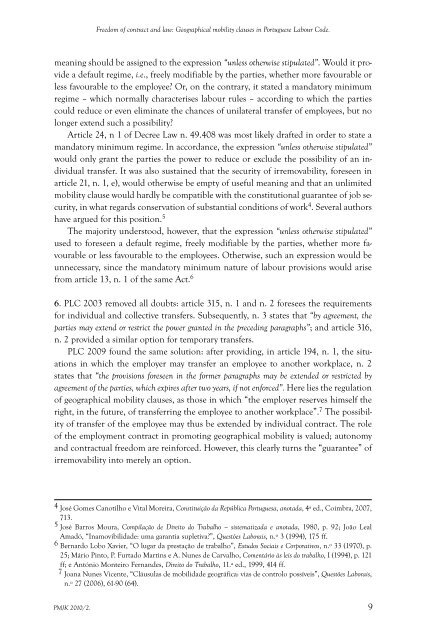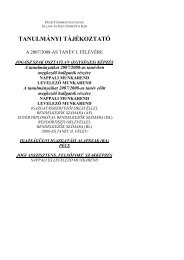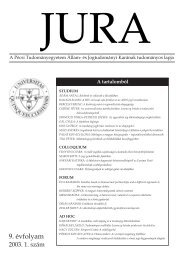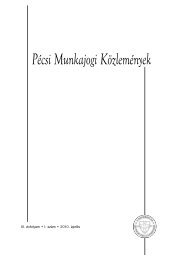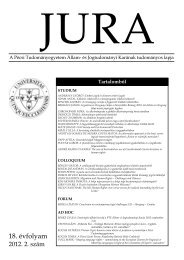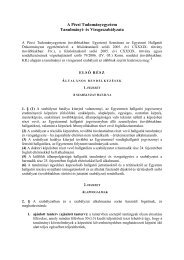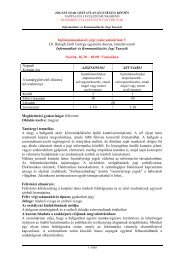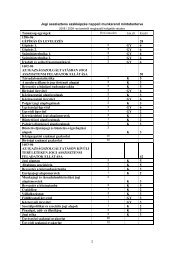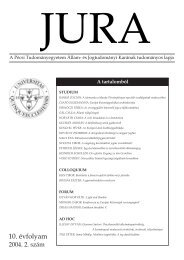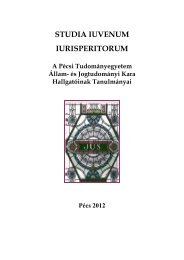Pécsi Munkajogi Közlemények - ICELL - ÃsszehasonlÃtó és Európai ...
Pécsi Munkajogi Közlemények - ICELL - ÃsszehasonlÃtó és Európai ...
Pécsi Munkajogi Közlemények - ICELL - ÃsszehasonlÃtó és Európai ...
You also want an ePaper? Increase the reach of your titles
YUMPU automatically turns print PDFs into web optimized ePapers that Google loves.
Freedom of contract and law: Geographical mobility clauses in Portuguese Labour Code.<br />
meaning should be assigned to the expression “unless otherwise stipulated”. Would it provide<br />
a default regime, i.e., freely modifiable by the parties, whether more favourable or<br />
less favourable to the employee? Or, on the contrary, it stated a mandatory minimum<br />
regime – which normally characterises labour rules – according to which the parties<br />
could reduce or even eliminate the chances of unilateral transfer of employees, but no<br />
longer extend such a possibility?<br />
Article 24, n 1 of Decree Law n. 49.408 was most likely drafted in order to state a<br />
mandatory minimum regime. In accordance, the expression “unless otherwise stipulated”<br />
would only grant the parties the power to reduce or exclude the possibility of an individual<br />
transfer. It was also sustained that the security of irremovability, foreseen in<br />
article 21, n. 1, e), would otherwise be empty of useful meaning and that an unlimited<br />
mobility clause would hardly be compatible with the constitutional guarantee of job security,<br />
in what regards conservation of substantial conditions of work 4 . Several authors<br />
have argued for this position. 5<br />
The majority understood, however, that the expression “unless otherwise stipulated”<br />
used to foreseen a default regime, freely modifiable by the parties, whether more favourable<br />
or less favourable to the employees. Otherwise, such an expression would be<br />
unnecessary, since the mandatory minimum nature of labour provisions would arise<br />
from article 13, n. 1 of the same Act. 6<br />
6. PLC 2003 removed all doubts: article 315, n. 1 and n. 2 foresees the requirements<br />
for individual and collective transfers. Subsequently, n. 3 states that “by agreement, the<br />
parties may extend or restrict the power granted in the preceding paragraphs”; and article 316,<br />
n. 2 provided a similar option for temporary transfers.<br />
PLC 2009 found the same solution: after providing, in article 194, n. 1, the situations<br />
in which the employer may transfer an employee to another workplace, n. 2<br />
states that “the provisions foreseen in the former paragraphs may be extended or restricted by<br />
agreement of the parties, which expires after two years, if not enforced”. Here lies the regulation<br />
of geographical mobility clauses, as those in which “the employer reserves himself the<br />
right, in the future, of transferring the employee to another workplace”. 7 The possibility<br />
of transfer of the employee may thus be extended by individual contract. The role<br />
of the employment contract in promoting geographical mobility is valued; autonomy<br />
and contractual freedom are reinforced. However, this clearly turns the “guarantee” of<br />
irremovability into merely an option.<br />
4 José Gomes Canotilho e Vital Moreira, Constituição da República Portuguesa, anotada, 4ª ed., Coimbra, 2007,<br />
713.<br />
5 José Barros Moura, Compilação de Direito do Trabalho – sistematizada e anotada, 1980, p. 92; João Leal<br />
Amadó, “Inamovibilidade: uma garantia supletiva?”, Questões Laborais, n.º 3 (1994), 175 ff.<br />
6 Bernardo Lobo Xavier, “O lugar da prestação de trabalho”, Estudos Sociais e Corporativos, n.º 33 (1970), p.<br />
25; Mário Pinto, P. Furtado Martins e A. Nunes de Carvalho, Comentário às leis do trabalho, I (1994), p. 121<br />
ff; e António Monteiro Fernandes, Direito do Trabalho, 11.ª ed., 1999, 414 ff.<br />
7 Joana Nunes Vicente, “Cláusulas de mobilidade geográfica: vias de controlo possíveis”, Questões Laborais,<br />
n.º 27 (2006), 61-90 (64).<br />
PMJK 2010/2. 9


